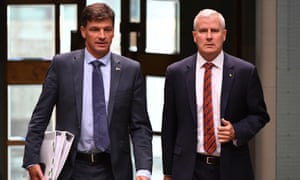Extract from The Guardian
Energy
Six MPs fire internal warning shot with call for new power station construction and ‘big stick’
Six Queensland Nationals have demanded Michael McCormack
and Angus Taylor take “immediate action” to underwrite new power
station construction in regional Queensland, and pass the “big stick”
package in the final sitting week of the 45th parliament.
George Christensen, Michelle Landry, Ken O’Dowd, Keith Pitt, Llew O’Brien and Barry O’Sullivan have fired an internal warning shot across the bow of the Nationals leader by demanding that McCormack insist the Liberals take concrete action on energy before the coming election.
Revealing the scope of internal frustration with McCormack and with the Liberals, including Taylor, the energy minister, the six Nationals have told their leader, in a letter seen by Guardian Australia, that they are under siege about high energy prices in their electorates.
They say “everyday consumers are at their wits’ end” because they cannot afford “such exorbitant energy costs” and the government needs to deliver both new supply and divestiture powers, because “without divestiture powers, in our view, no action can be taken which would cause Queensland Labor to reduce power prices”.
The MPs note they have been pursuing reform to lower power prices for
six years, persisting even when thwarted periodically by state LNP
colleagues.George Christensen, Michelle Landry, Ken O’Dowd, Keith Pitt, Llew O’Brien and Barry O’Sullivan have fired an internal warning shot across the bow of the Nationals leader by demanding that McCormack insist the Liberals take concrete action on energy before the coming election.
Revealing the scope of internal frustration with McCormack and with the Liberals, including Taylor, the energy minister, the six Nationals have told their leader, in a letter seen by Guardian Australia, that they are under siege about high energy prices in their electorates.
They say “everyday consumers are at their wits’ end” because they cannot afford “such exorbitant energy costs” and the government needs to deliver both new supply and divestiture powers, because “without divestiture powers, in our view, no action can be taken which would cause Queensland Labor to reduce power prices”.
The big stick package has been popular with Nationals, but contentious with Liberals, because it includes a power to break up big energy companies if they engage in price gouging, a power which has prompted a concerted backlash in the business sector.
The government pulled the package during the last parliamentary sitting because Labor and the Greens had the numbers in the lower house to force an amendment that would have prohibited the commonwealth from underwriting new investments in coal – an amendment the government doesn’t want to accept.
While it has shelved the so-called “big stick”, the government has flagged an intention to proceed with taxpayer underwriting of new investments in power generation – including, potentially, new coal plants.
The resources minister, Matt Canavan, has confirmed the government is currently considering the merits of around 10 coal projects, but it is unclear whether anything can be locked in before the election.
A recent legal opinion suggests the Morrison government will not have the ability to roll out taxpayer support to its controversial coal underwriting plan unless it enacts supporting legislation or amends existing legislation. If that advice is correct, the remaining parliamentary sitting window looks too tight to achieve that outcome.
Despite opposing new coal investment, Labor has signalled it would honour contracts the government entered into with proponents to avoid the spectre of sovereign risk, but only if any contract is validly executed.
The government has also complicated the picture by sending mixed signals.
The prime minister foreshadowed last week, during an attempted pivot on climate change, that the government could use the underwriting program for new power generation to support the “battery of the nation” proposal in Tasmania and he also pledged $56m to a proposed interconnector that would bring renewable energy from Tasmania to the mainland.
But the proponents of the interconnector have made it clear the viability of the project depends on coal leaving the system, and relatively quickly, which creates an obvious contradiction if the Coalition also proceeds with backing new coal.
The feasibility study says the “largest single influencing factor in the economic feasibility and timing of Marinus Link is the trajectory of coal-fired generation retirement in the national electricity market”.

No comments:
Post a Comment